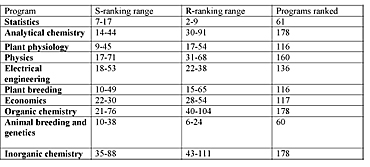AMES, Iowa - Iowa State University doctoral programs in statistics, chemistry, agricultural sciences, physics, electrical engineering and economics earned high marks in data-based rankings released today by the National Research Council.
The council ranked more than 5,000 doctoral programs in 62 fields at 212 universities across the United States based on data from the 2005-2006 academic year, including 50 programs at Iowa State. The rankings are based on 20 data measurements including publications per faculty member, percent of faculty with grants, percent of female students and percent of students completing a doctorate within six years. The council last ranked doctoral program in 1995.
The council's new report said the rankings are designed to improve doctoral education in the U.S. by providing administrators, faculty and funders with data that allows them to compare, evaluate and strengthen programs. It also gives students data to help them identify programs that meet their needs.
"Strong and competitive doctoral programs are a necessity for Iowa State University to help Iowa, the country and the world meet the challenges of the 21st century," said Iowa State President Gregory Geoffroy. "They are magnets for attracting outstanding faculty and students. And they produce the research and creativity needed to build a more sustainable and healthy future."
The research council reports its findings as ranges in two different rankings. The committee overseeing the report said it would be misleading to use a single number to rank programs because "there are significant uncertainties and variability in any ranking process."
The committee said its survey-based rankings (S-rankings) reflect surveys of faculty members who were asked to rate the 20 measures of program quality. Measures were weighted based on those responses. Those weighted measures varied from field to field.
The committee said its regression-based rankings (R-rankings) reflect an indirect approach to identifying what faculty value in a program. A sample group of faculty were asked to rate several programs in their fields. A statistical analysis then calculated how measures should be weighed in each field to duplicate the results of the faculty ratings.
Here are ten Iowa State doctoral programs that placed high in the rankings:

Additional Iowa State doctoral programs in the top half of the rankings include psychology; genetics; meat science; health and human performance; computer science; human development and family studies; and chemical engineering.
The full rankings are available on the website of the National Academies Press.
In a letter accompanying the rankings, the leaders of the three national organizations that oversee the National Research Council called on universities to regularly update the study's data so programs can be continually evaluated.
"If this is done with the updated dataset as an important new tool, and we strive to improve what is already the world's strongest system of higher education," wrote Ralph Cicerone, president of the National Academy of Sciences; Charles Vest, president of the National Academy of Engineering; and Harvey Fineberg, president of the Institute of Medicine, "we believe that American doctoral education can continue to bring enormous benefits to our citizens and remain the envy of the world."
The three organizations, plus the National Research Council, are known as the National Academies and are charged with producing reports that help shape national policies, inform public opinion and advance the country's pursuit of science, engineering and medicine.